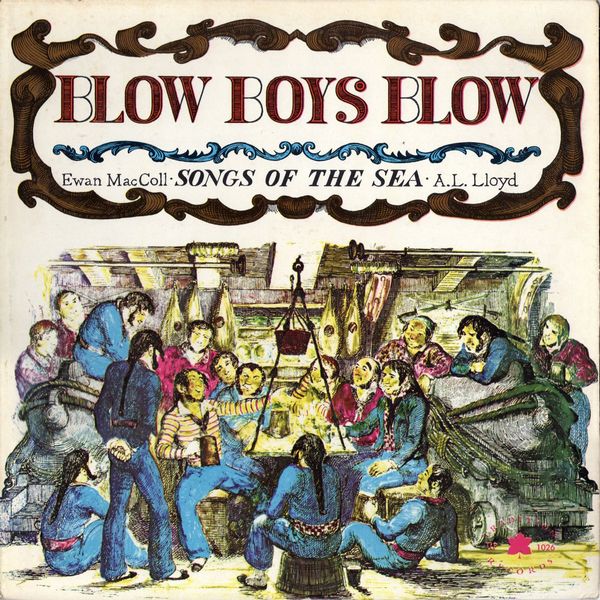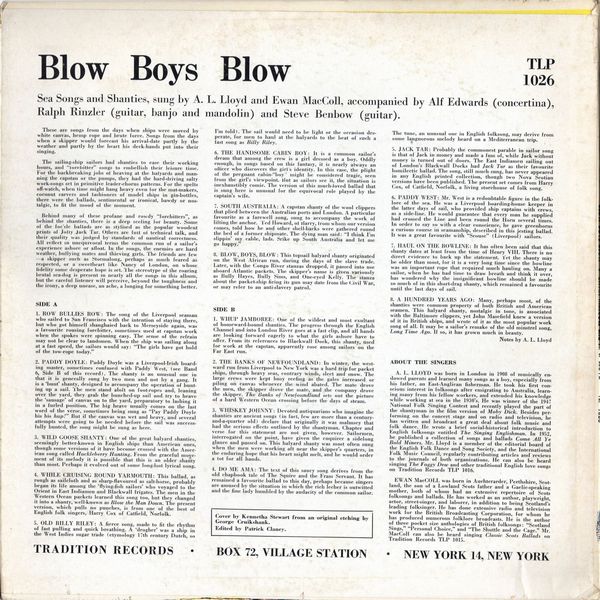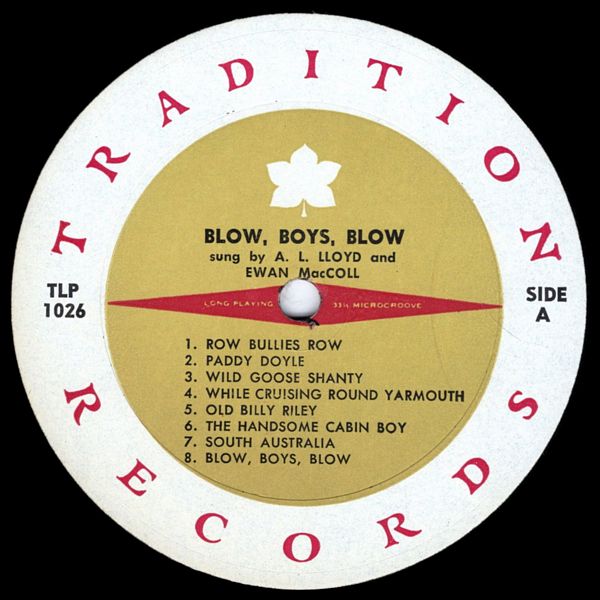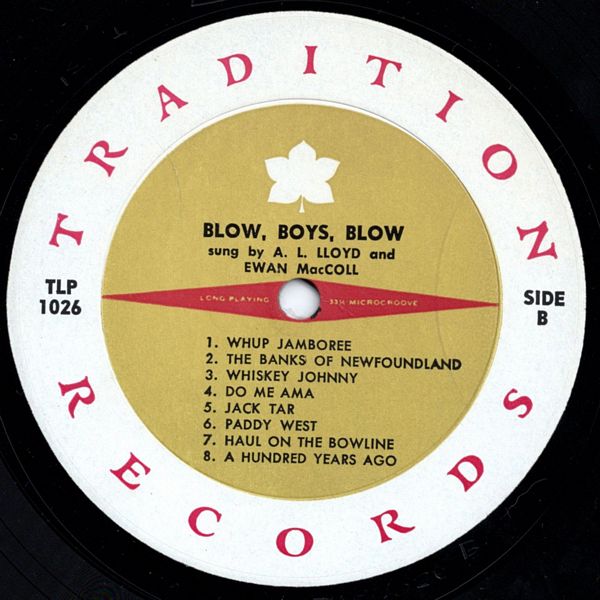

 |



|
Sleeve Notes
These are songs from the days when ships were moved by white canvas, hemp rope and brute force. Songs from the days when a skipper would forecast his arrival-date partly by tile weather and partly by the heart his deck-hands put into their singing.
The sailing-ship sailors had shanties to ease their working hours, and "forebitter" songs to embellish their leisure time. For the backbreaking jobs of heaving at the halyards and manning the capstan or the pumps, they had the hard-driving salty work-songs set in primitive leader-chorus patterns. For the spells off-watch, when time might hang heavy even for the mat-makers, coconut carvers and fashioners of model ships in gin-bottles, there were the ballads, sentimental or ironical, bawdy or nostalgic, to fit the mood of the moment.
Behind many of these profane and rowdy "forebitters", as behind the shanties, there is a deep feeling for beauty. Some of the foc'sle ballads are as stylised as the popular woodcut prints of Jolly Jack Tar. Others are full of technical talk, and their quality was judged by standards of nautical correctness. All reflect in unequivocal terms the common run of a sailor's experience ashore or afloat. In the songs, the enemies are hard weather, bullying mates and thieving girls. The friends are few—a skipper such as Stormalong, perhaps as much feared as respected, or a sweetheart like Nancy of London, on whose fidelity some desperate hope is set. The stereotype of the roaring brutal sea-dog is present in nearly all the songs in this album, but the careful listener will perceive, beyond the toughness and the irony, a deep unease, an ache, a longing for something better.
ROW BULLIES ROW: The song of the Liverpool seaman who sailed to San Francisco with the intention of staying there, hut who got himself shanghaied back to Merseyside again, was a favourite rousing forebitter, sometimes used at capstan work when the spokes were spinning easy. The sense of the refrain may not be clear to landsmen. When the ship was sailing along at a fast speed, the sailors would say: "The girls have got hold of the tow-rope today."
PADDY DOYLE: Paddy Doyle was a Liverpool-Irish boarding master, sometimes confused with Paddy West, (see Band 6, Side B of this record). The shanty is an unusual one in that it is generally sung by two men and not by a gang, it is a 'bunt' shanty, designed to accompany tile operation of bunting up a sail. The men stand aloft on foot-ropes and, leaning over the yard, they grab tile hunched-up sail and try to heave the 'sausage' of canvas on to the yard, preparatory to lashing it in a furled position. The big heave usually comes on the last word of the verse, sometimes being sung as "Pay Paddy Doyle his his hup!" But if the canvas was wet and heavy, and several attempts were going to he needed before the sail was successfully bunted, the song might be sung as here.
WILD GOOSE SHANTY: One of the great halyard shanties, seemingly better-known in English ships than American ones, though some versions of it have become crossed with the American song called Huckleberry Hunting. From the graceful movement of its melody it is possible that this is an older shanty than most. Perhaps it evolved out of some long-lost lyrical song.
WHILE CRUISING ROUND YARMOUTH: This ballad, as rough as sailcloth and as sharp-flavoured as salt-horse, probably began its life among the 'flying-fish sailors' who voyaged to the Orient in East Indiamen and Blackwall frigates. The men in the Western Ocean packets learned this song too, but they changed it into a shanty, well-known as Blow the Man Down. The present version, which pulls no punches, is from one of the best of English folk singers, Harry Cox of Catfield, Norfolk.
OLD BILLY RILEY: A fierce song, made to fit the rhythm of fast pulling and quick breathing. A 'drogher' was a ship in the West Indies sugar trade (etymology 17th century Dutch, so I'm told). The sail would need to be light or the occasion desperate, for flies' to haul at the halyards to the beat of such a last song as Billy Riley.
THE HANDSOME CABIN BOY: It is a common sailor's dream that among the crew is a girl dressed as a boy. Oddly enough, in songs based on this fantasy, it is nearly always an officer who discovers the girl's identity. In this case, the plight of the pregnant cabin-"boy" might be considered tragic, seen from the girl's viewpoint. But as sailors see it, the situation is inexhaustibly comic. The version of this much-loved ballad that is sung here is unusual for the equivocal role played by the captain's wife.
SOUTH AUSTRALIA: A capstan shanty of the wool clippers that plied between the Australian ports and London. A particular favourite as a farewell song, sung to accompany the work of lifting the anchor. Ted Howard, of Barry, from whom our version comes, told how he and other shell-backs were gathered round the bed of a former shipmate. The dying man said "I think I'm slippin' my cable, lads. Srike up South Australia and let me go happy."
BLOW, BOYS, BLOW: This topsail halyard shanty originated on the West African run, during the days of the slave trade. Later, with the Congo River stanzas dropped, it passed into use aboard Atlantic packets. The skipper's name is given variously as Bully Hayes, Bully Suns, arid One-eyed Kelly. The stanza about the packet-ship firing its gun may date from the Civil War, or 'nay refer to an anti-slavery patrol.
WHUP JAMBOREE: One of the wildest and most exultant of homeward-bound shanties. The progress through the English Channel and into London River goes at a fast clip, and nil hands are looking forward eagerly to what the girls ashore have to offer. From its references to Blackwall Dock, this shanty, used for work at the capstan, apparently rose among sailors on the Far East run.
THE BANKS OF NEWFOUNDLAND: In winter, the westward run from Liverpool to New York was a hard trip for packet ships, through heavy seas, contrary winds, sleet and snow. The large crews were kept busy reeling as the gales increased or piling on canvas whenever the wind abated. The mate drove the men, the skipper drove the mate, and the company drove the skipper. The Banks of Newfoundland sets out the picture of a hard Western Ocean crossing before the days of steam.
WHISKEY JOHNNY: Devoted antiquarians who imagine the shanties are ancient songs (in fact, few are more than a century- and-a-quarter old) declare that originally it was malmsey that had the serious effects outlined by the shantyman. Chapter and verse for this statement are not given, however. Sailormen, interrogated on the point, have given the enquirer a sidelong glance and passed on. This halyard shanty was most often sung when the men ware working aft near the skipper's quarters, in the enduring hope that his heart might melt, and he would order a tot for all hands.
DO ME AMA: The text of this saucy song derives from the old chaphook tale of The Squire and the Fram Servant. It has remained a favourite ballad to this day, perhaps because singers are amused by the situation in which the rich lecher is outwitted and the fine lady humbled by the audacity of the common sailor. The tune, an unusual one in English folksong, may derive from some languorous melody heard on a Mediterranean trip.
JACK TAR: Probably the commonest parable in sailor song is that of Jack in money and made a fuss of, while Jack without money is turned out of doors. The East Indiamen sailing out of London's Blackwall Docks had Jack Tar as their favourite homilectic ballad. The song, still much sung, has never appeared in any English printed collection, though two Nova Scotian versions have been published. The present set comes from Harry Cox, of Catfield, Norfolk, a living storehouse of folk song.
PADDY WEST: Mr. West is a redoubtable figure ia the folk. lore of the sea. He was a Liverpool boarding-house keeper in the latter days of sail, who provided ship captains with crews, as a side-line. He would guarantee that every man he supplied had crossed the Line and been round the Horn several times. In order to say so with a clear conscience, he gave greenhorns a curious course in seamanship, described in this jesting ballad. It was a great favourite with "Scouse" (Liverpool) sailors.
HAUL ON THE BOWLINE: it has often been said that this shanty dates at least from the time of Henry VIII. There is no direct evidence to back up the statement. Yet the shanty may be older than most, for it is a very long time since the bowline was an important rope that required much hauling on. Many a sailor, when he has had time to draw breath and think it over, has wondered why the insignificant bowline should be made so much of in this short-drag shanty, which remained a favourite until the last days of sail.
A HUNDRED YEARS AGO: Many, perhaps most, of the shanties were common property of both British and American seamen. This halyard shanty, nostalgic in tone, is associated with the Baltimore clippers, yet John Masefield knew a version of it in British ships, and wrote of it as the most popular work song of all. It may be a sailor's remake of the old minstrel song, Long Time Ago. If so, it has grown much in beauty.
Notes by A. L. Lloyd
ABOUT THE SINGERS
A. L. LLOYD was born in London in 1908 of musically endowed parents and learned many songs as a boy, especially from his father, an East-Anglican fisherman. He took his first conscious interest in folksongs after emigrating to Australia, learning many from his fellow workers, and extended his knowledge while working at sea in the 1930's. He was winner of the 1947 National Folk Singing Contest and recently played the part of the shantyntan in the film version of Moby Dick. Besides performing on the concert stage and on radio and television, he has written and broadcast a great deal about folk music and folk dance. He wrote a brief social-historical introduction to English folksongs entitled The Singing Englishman. In 1952, he published a collection of songs and ballads Come All Ye Bold Miners. Mr. Lloyd is a member of the editorial board of the English Folk Dance and Song Society, and the International Folk Music Council, regularly contributing articles and reviews to the journals of both organizations. He can also be heard singing The Foggy Dew and other traditional English love songs on Tradition Records TLP 1016.
EWAN MacCOLL was born in Auchterarder, Perthshire, Scotland, the son of a Lowland Scots father and a Gaelic-speaking mother, both of whom had an extensive repertoire of Scots folksongs and ballads. He has worked as an author, playwright, actor, street-singer, and laborer, in addition to being Scotland's leading folksinger. He has done extensive radio and television work for the British Broadcasting Corporation, for whom he has produced numerous folklore broadcasts. He is the author of three pocket size anthologies of British folksongs: "Scotland Sings, " "Personal Choice, " and "The Shuttle and the Cage." Mr. MacColl can also he heard singing Classic Scots Ballads on Tradition Records TLP 1015.